The Atomic Bombing of Japan: Justified or Unjustified? A Debate
VerifiedAdded on 2023/04/24
|6
|1647
|496
Essay
AI Summary
This essay provides a comprehensive discussion on the controversial dropping of atomic bombs on Hiroshima and Nagasaki by the United States in 1945 during the final stages of World War II. The essay argues that the atomic bombing was unjustified, presenting arguments against its necessity. It begins with a brief background of the events and then delves into the justifications often provided, such as saving American lives and shortening the war. However, it counters these arguments by highlighting the atomic bomb's initial purpose as a deterrent, the unacceptable terms of the Potsdam Declaration, and the violation of international laws against bombing civilians. The essay emphasizes that the US had alternative options and that the bombing was motivated by political and military objectives, disregarding the immense loss of innocent lives and the long-term health consequences. The conclusion reiterates the essay's stance that the bombing was unjustified, advocating for a more humane approach during the war.
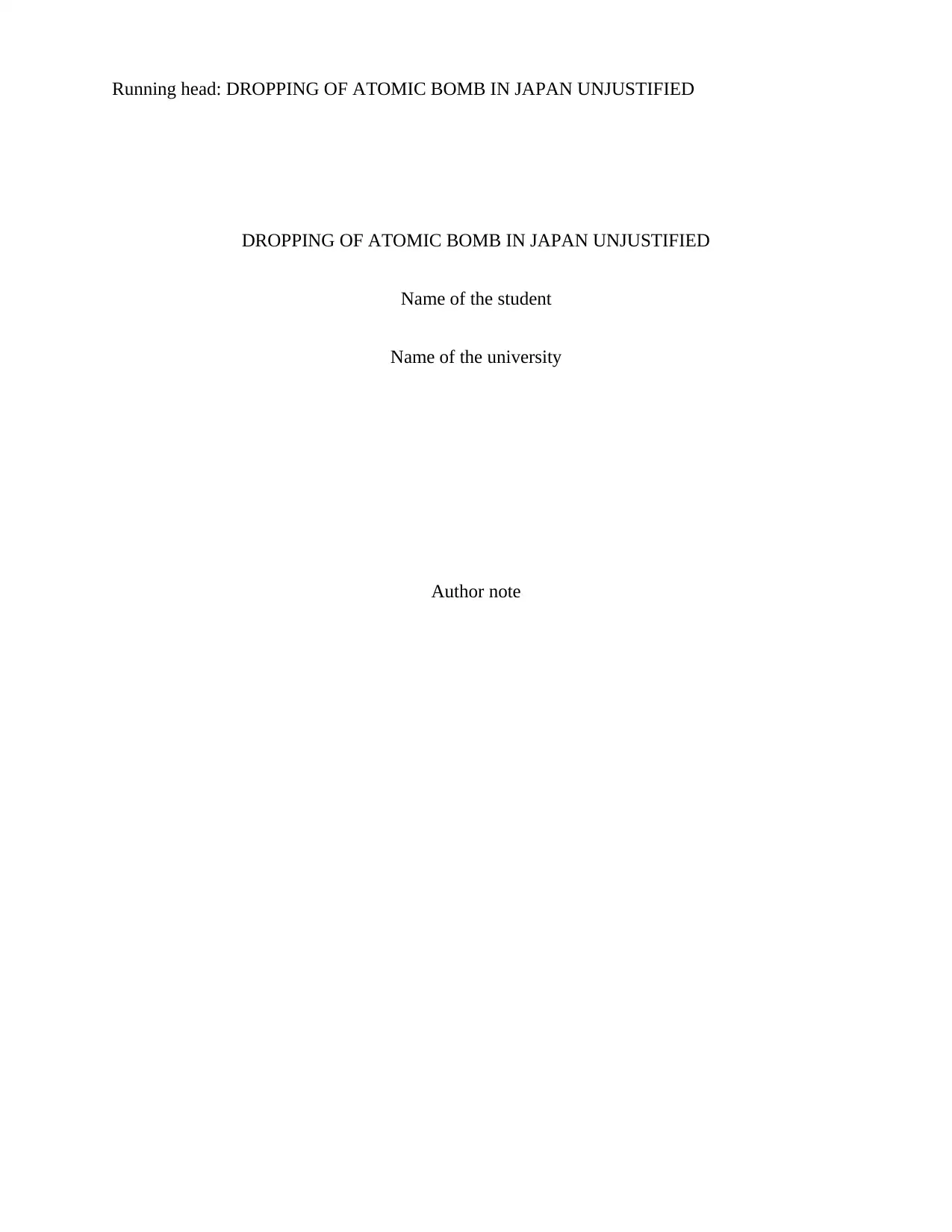
Running head: DROPPING OF ATOMIC BOMB IN JAPAN UNJUSTIFIED
DROPPING OF ATOMIC BOMB IN JAPAN UNJUSTIFIED
Name of the student
Name of the university
Author note
DROPPING OF ATOMIC BOMB IN JAPAN UNJUSTIFIED
Name of the student
Name of the university
Author note
Paraphrase This Document
Need a fresh take? Get an instant paraphrase of this document with our AI Paraphraser
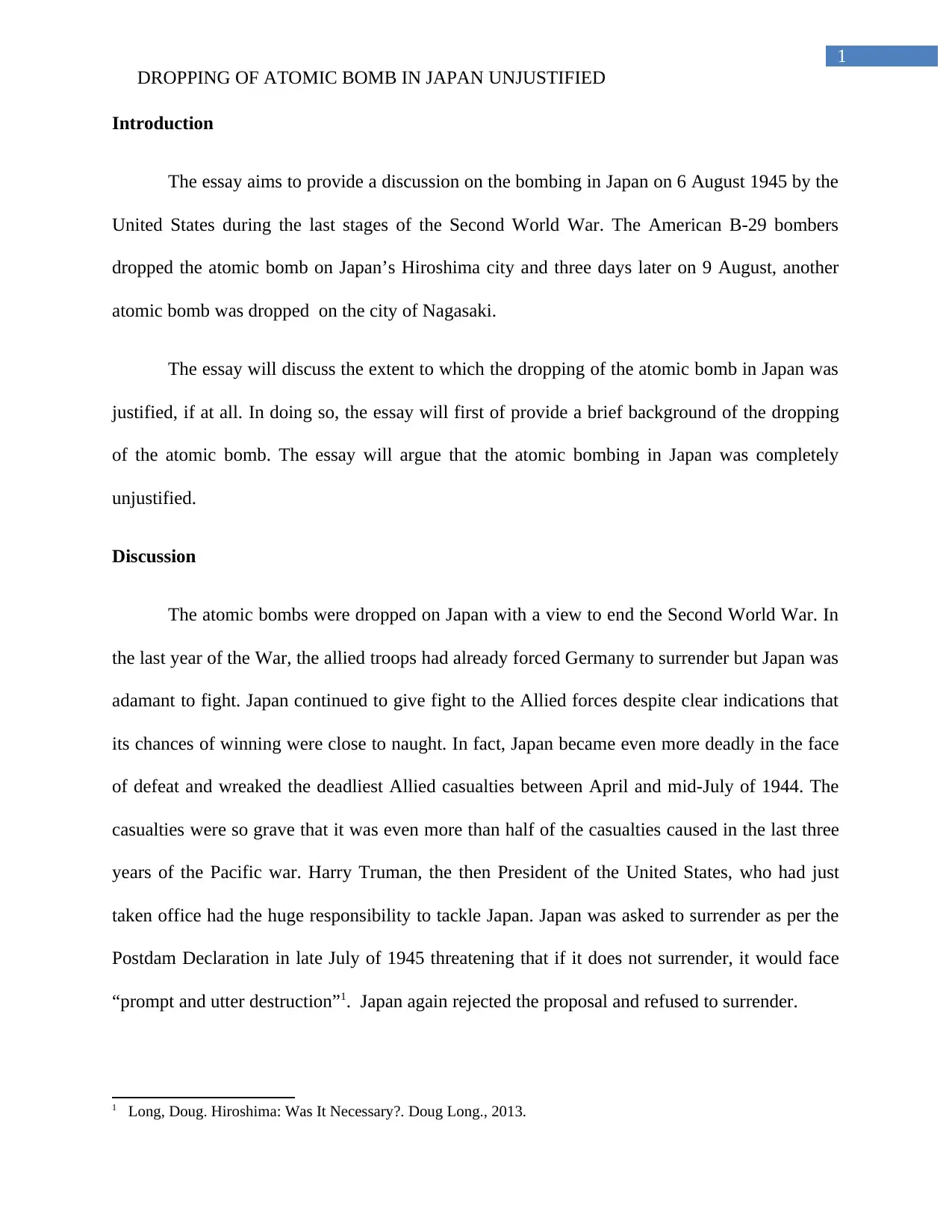
1
DROPPING OF ATOMIC BOMB IN JAPAN UNJUSTIFIED
Introduction
The essay aims to provide a discussion on the bombing in Japan on 6 August 1945 by the
United States during the last stages of the Second World War. The American B-29 bombers
dropped the atomic bomb on Japan’s Hiroshima city and three days later on 9 August, another
atomic bomb was dropped on the city of Nagasaki.
The essay will discuss the extent to which the dropping of the atomic bomb in Japan was
justified, if at all. In doing so, the essay will first of provide a brief background of the dropping
of the atomic bomb. The essay will argue that the atomic bombing in Japan was completely
unjustified.
Discussion
The atomic bombs were dropped on Japan with a view to end the Second World War. In
the last year of the War, the allied troops had already forced Germany to surrender but Japan was
adamant to fight. Japan continued to give fight to the Allied forces despite clear indications that
its chances of winning were close to naught. In fact, Japan became even more deadly in the face
of defeat and wreaked the deadliest Allied casualties between April and mid-July of 1944. The
casualties were so grave that it was even more than half of the casualties caused in the last three
years of the Pacific war. Harry Truman, the then President of the United States, who had just
taken office had the huge responsibility to tackle Japan. Japan was asked to surrender as per the
Postdam Declaration in late July of 1945 threatening that if it does not surrender, it would face
“prompt and utter destruction”1. Japan again rejected the proposal and refused to surrender.
1 Long, Doug. Hiroshima: Was It Necessary?. Doug Long., 2013.
DROPPING OF ATOMIC BOMB IN JAPAN UNJUSTIFIED
Introduction
The essay aims to provide a discussion on the bombing in Japan on 6 August 1945 by the
United States during the last stages of the Second World War. The American B-29 bombers
dropped the atomic bomb on Japan’s Hiroshima city and three days later on 9 August, another
atomic bomb was dropped on the city of Nagasaki.
The essay will discuss the extent to which the dropping of the atomic bomb in Japan was
justified, if at all. In doing so, the essay will first of provide a brief background of the dropping
of the atomic bomb. The essay will argue that the atomic bombing in Japan was completely
unjustified.
Discussion
The atomic bombs were dropped on Japan with a view to end the Second World War. In
the last year of the War, the allied troops had already forced Germany to surrender but Japan was
adamant to fight. Japan continued to give fight to the Allied forces despite clear indications that
its chances of winning were close to naught. In fact, Japan became even more deadly in the face
of defeat and wreaked the deadliest Allied casualties between April and mid-July of 1944. The
casualties were so grave that it was even more than half of the casualties caused in the last three
years of the Pacific war. Harry Truman, the then President of the United States, who had just
taken office had the huge responsibility to tackle Japan. Japan was asked to surrender as per the
Postdam Declaration in late July of 1945 threatening that if it does not surrender, it would face
“prompt and utter destruction”1. Japan again rejected the proposal and refused to surrender.
1 Long, Doug. Hiroshima: Was It Necessary?. Doug Long., 2013.
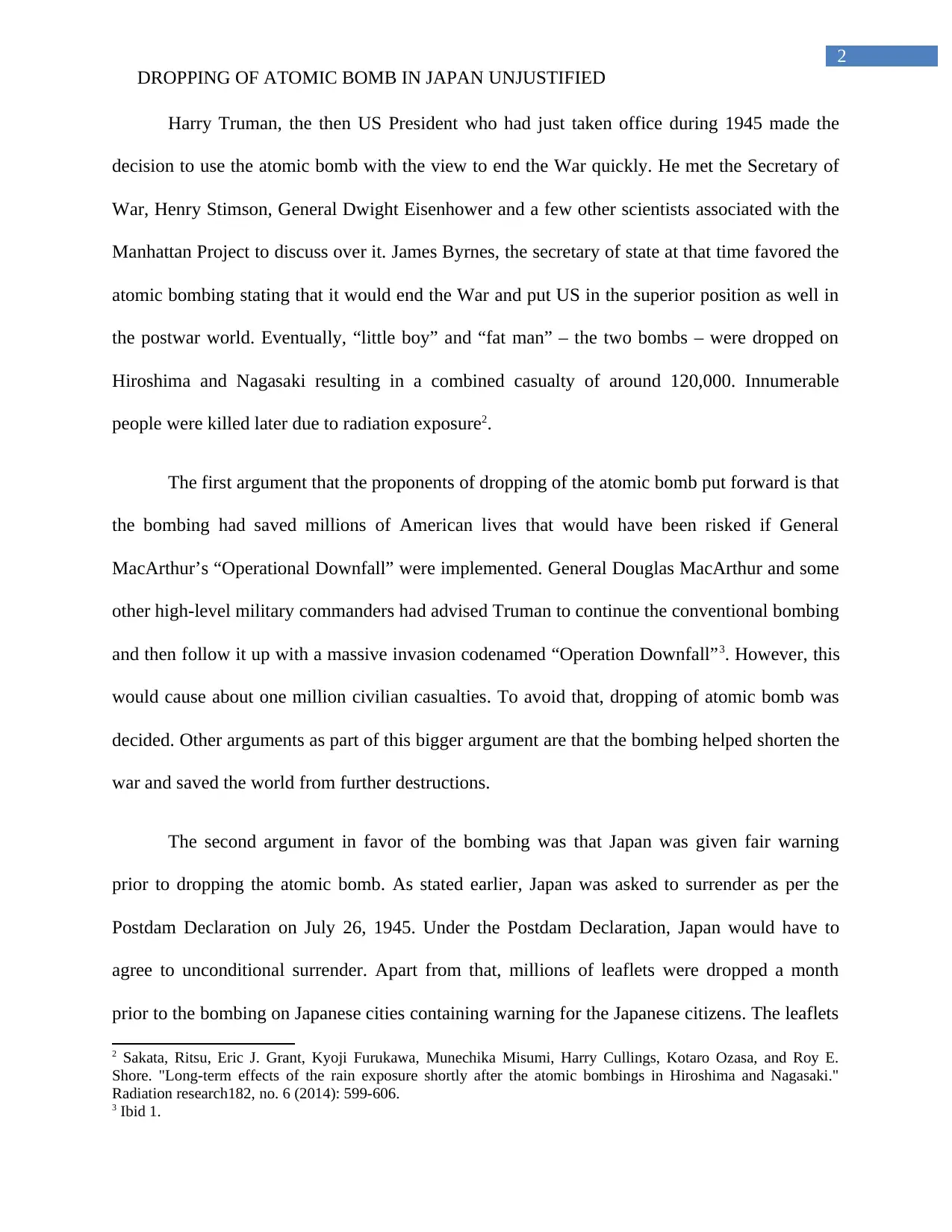
2
DROPPING OF ATOMIC BOMB IN JAPAN UNJUSTIFIED
Harry Truman, the then US President who had just taken office during 1945 made the
decision to use the atomic bomb with the view to end the War quickly. He met the Secretary of
War, Henry Stimson, General Dwight Eisenhower and a few other scientists associated with the
Manhattan Project to discuss over it. James Byrnes, the secretary of state at that time favored the
atomic bombing stating that it would end the War and put US in the superior position as well in
the postwar world. Eventually, “little boy” and “fat man” – the two bombs – were dropped on
Hiroshima and Nagasaki resulting in a combined casualty of around 120,000. Innumerable
people were killed later due to radiation exposure2.
The first argument that the proponents of dropping of the atomic bomb put forward is that
the bombing had saved millions of American lives that would have been risked if General
MacArthur’s “Operational Downfall” were implemented. General Douglas MacArthur and some
other high-level military commanders had advised Truman to continue the conventional bombing
and then follow it up with a massive invasion codenamed “Operation Downfall”3. However, this
would cause about one million civilian casualties. To avoid that, dropping of atomic bomb was
decided. Other arguments as part of this bigger argument are that the bombing helped shorten the
war and saved the world from further destructions.
The second argument in favor of the bombing was that Japan was given fair warning
prior to dropping the atomic bomb. As stated earlier, Japan was asked to surrender as per the
Postdam Declaration on July 26, 1945. Under the Postdam Declaration, Japan would have to
agree to unconditional surrender. Apart from that, millions of leaflets were dropped a month
prior to the bombing on Japanese cities containing warning for the Japanese citizens. The leaflets
2 Sakata, Ritsu, Eric J. Grant, Kyoji Furukawa, Munechika Misumi, Harry Cullings, Kotaro Ozasa, and Roy E.
Shore. "Long-term effects of the rain exposure shortly after the atomic bombings in Hiroshima and Nagasaki."
Radiation research182, no. 6 (2014): 599-606.
3 Ibid 1.
DROPPING OF ATOMIC BOMB IN JAPAN UNJUSTIFIED
Harry Truman, the then US President who had just taken office during 1945 made the
decision to use the atomic bomb with the view to end the War quickly. He met the Secretary of
War, Henry Stimson, General Dwight Eisenhower and a few other scientists associated with the
Manhattan Project to discuss over it. James Byrnes, the secretary of state at that time favored the
atomic bombing stating that it would end the War and put US in the superior position as well in
the postwar world. Eventually, “little boy” and “fat man” – the two bombs – were dropped on
Hiroshima and Nagasaki resulting in a combined casualty of around 120,000. Innumerable
people were killed later due to radiation exposure2.
The first argument that the proponents of dropping of the atomic bomb put forward is that
the bombing had saved millions of American lives that would have been risked if General
MacArthur’s “Operational Downfall” were implemented. General Douglas MacArthur and some
other high-level military commanders had advised Truman to continue the conventional bombing
and then follow it up with a massive invasion codenamed “Operation Downfall”3. However, this
would cause about one million civilian casualties. To avoid that, dropping of atomic bomb was
decided. Other arguments as part of this bigger argument are that the bombing helped shorten the
war and saved the world from further destructions.
The second argument in favor of the bombing was that Japan was given fair warning
prior to dropping the atomic bomb. As stated earlier, Japan was asked to surrender as per the
Postdam Declaration on July 26, 1945. Under the Postdam Declaration, Japan would have to
agree to unconditional surrender. Apart from that, millions of leaflets were dropped a month
prior to the bombing on Japanese cities containing warning for the Japanese citizens. The leaflets
2 Sakata, Ritsu, Eric J. Grant, Kyoji Furukawa, Munechika Misumi, Harry Cullings, Kotaro Ozasa, and Roy E.
Shore. "Long-term effects of the rain exposure shortly after the atomic bombings in Hiroshima and Nagasaki."
Radiation research182, no. 6 (2014): 599-606.
3 Ibid 1.
⊘ This is a preview!⊘
Do you want full access?
Subscribe today to unlock all pages.

Trusted by 1+ million students worldwide
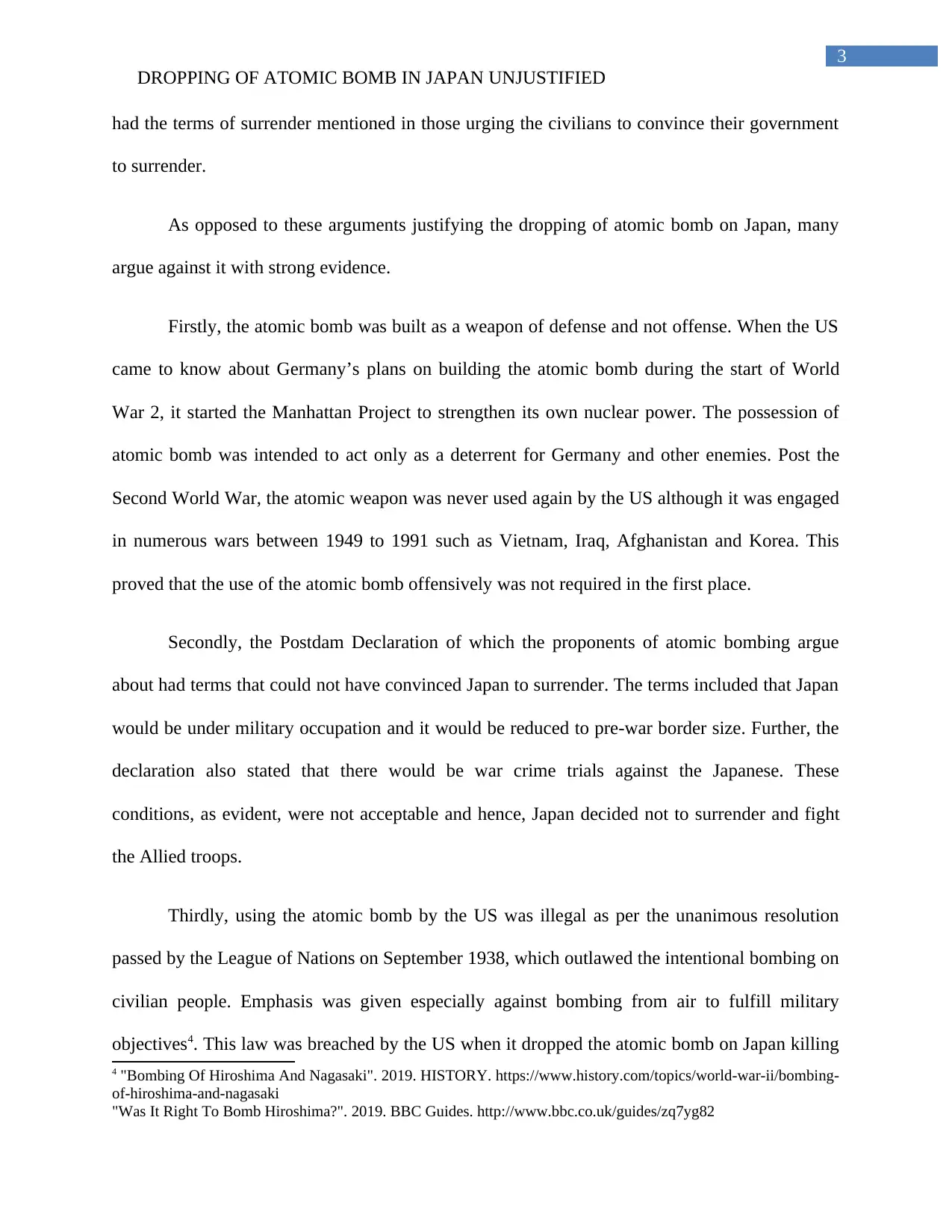
3
DROPPING OF ATOMIC BOMB IN JAPAN UNJUSTIFIED
had the terms of surrender mentioned in those urging the civilians to convince their government
to surrender.
As opposed to these arguments justifying the dropping of atomic bomb on Japan, many
argue against it with strong evidence.
Firstly, the atomic bomb was built as a weapon of defense and not offense. When the US
came to know about Germany’s plans on building the atomic bomb during the start of World
War 2, it started the Manhattan Project to strengthen its own nuclear power. The possession of
atomic bomb was intended to act only as a deterrent for Germany and other enemies. Post the
Second World War, the atomic weapon was never used again by the US although it was engaged
in numerous wars between 1949 to 1991 such as Vietnam, Iraq, Afghanistan and Korea. This
proved that the use of the atomic bomb offensively was not required in the first place.
Secondly, the Postdam Declaration of which the proponents of atomic bombing argue
about had terms that could not have convinced Japan to surrender. The terms included that Japan
would be under military occupation and it would be reduced to pre-war border size. Further, the
declaration also stated that there would be war crime trials against the Japanese. These
conditions, as evident, were not acceptable and hence, Japan decided not to surrender and fight
the Allied troops.
Thirdly, using the atomic bomb by the US was illegal as per the unanimous resolution
passed by the League of Nations on September 1938, which outlawed the intentional bombing on
civilian people. Emphasis was given especially against bombing from air to fulfill military
objectives4. This law was breached by the US when it dropped the atomic bomb on Japan killing
4 "Bombing Of Hiroshima And Nagasaki". 2019. HISTORY. https://www.history.com/topics/world-war-ii/bombing-
of-hiroshima-and-nagasaki
"Was It Right To Bomb Hiroshima?". 2019. BBC Guides. http://www.bbc.co.uk/guides/zq7yg82
DROPPING OF ATOMIC BOMB IN JAPAN UNJUSTIFIED
had the terms of surrender mentioned in those urging the civilians to convince their government
to surrender.
As opposed to these arguments justifying the dropping of atomic bomb on Japan, many
argue against it with strong evidence.
Firstly, the atomic bomb was built as a weapon of defense and not offense. When the US
came to know about Germany’s plans on building the atomic bomb during the start of World
War 2, it started the Manhattan Project to strengthen its own nuclear power. The possession of
atomic bomb was intended to act only as a deterrent for Germany and other enemies. Post the
Second World War, the atomic weapon was never used again by the US although it was engaged
in numerous wars between 1949 to 1991 such as Vietnam, Iraq, Afghanistan and Korea. This
proved that the use of the atomic bomb offensively was not required in the first place.
Secondly, the Postdam Declaration of which the proponents of atomic bombing argue
about had terms that could not have convinced Japan to surrender. The terms included that Japan
would be under military occupation and it would be reduced to pre-war border size. Further, the
declaration also stated that there would be war crime trials against the Japanese. These
conditions, as evident, were not acceptable and hence, Japan decided not to surrender and fight
the Allied troops.
Thirdly, using the atomic bomb by the US was illegal as per the unanimous resolution
passed by the League of Nations on September 1938, which outlawed the intentional bombing on
civilian people. Emphasis was given especially against bombing from air to fulfill military
objectives4. This law was breached by the US when it dropped the atomic bomb on Japan killing
4 "Bombing Of Hiroshima And Nagasaki". 2019. HISTORY. https://www.history.com/topics/world-war-ii/bombing-
of-hiroshima-and-nagasaki
"Was It Right To Bomb Hiroshima?". 2019. BBC Guides. http://www.bbc.co.uk/guides/zq7yg82
Paraphrase This Document
Need a fresh take? Get an instant paraphrase of this document with our AI Paraphraser
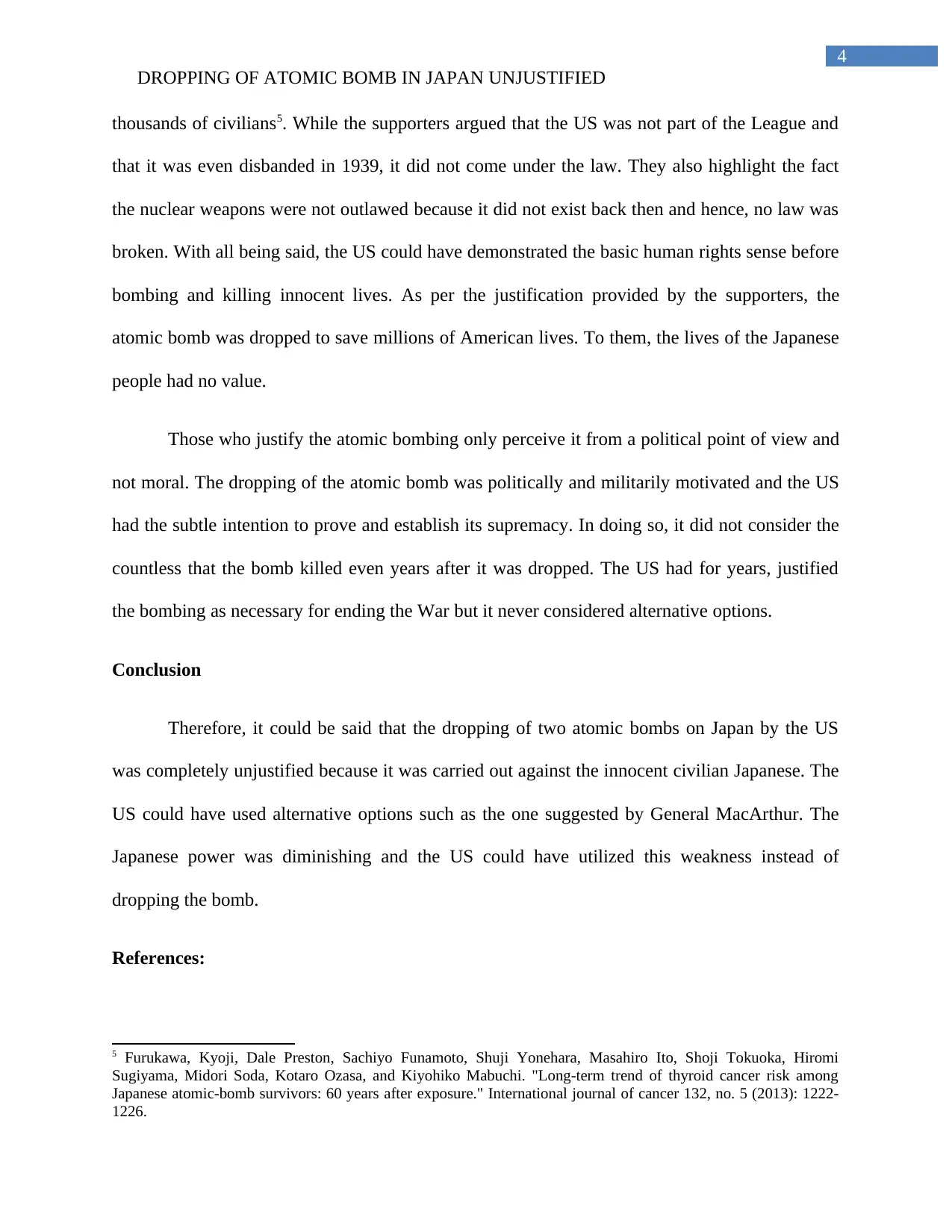
4
DROPPING OF ATOMIC BOMB IN JAPAN UNJUSTIFIED
thousands of civilians5. While the supporters argued that the US was not part of the League and
that it was even disbanded in 1939, it did not come under the law. They also highlight the fact
the nuclear weapons were not outlawed because it did not exist back then and hence, no law was
broken. With all being said, the US could have demonstrated the basic human rights sense before
bombing and killing innocent lives. As per the justification provided by the supporters, the
atomic bomb was dropped to save millions of American lives. To them, the lives of the Japanese
people had no value.
Those who justify the atomic bombing only perceive it from a political point of view and
not moral. The dropping of the atomic bomb was politically and militarily motivated and the US
had the subtle intention to prove and establish its supremacy. In doing so, it did not consider the
countless that the bomb killed even years after it was dropped. The US had for years, justified
the bombing as necessary for ending the War but it never considered alternative options.
Conclusion
Therefore, it could be said that the dropping of two atomic bombs on Japan by the US
was completely unjustified because it was carried out against the innocent civilian Japanese. The
US could have used alternative options such as the one suggested by General MacArthur. The
Japanese power was diminishing and the US could have utilized this weakness instead of
dropping the bomb.
References:
5 Furukawa, Kyoji, Dale Preston, Sachiyo Funamoto, Shuji Yonehara, Masahiro Ito, Shoji Tokuoka, Hiromi
Sugiyama, Midori Soda, Kotaro Ozasa, and Kiyohiko Mabuchi. "Long‐term trend of thyroid cancer risk among
Japanese atomic‐bomb survivors: 60 years after exposure." International journal of cancer 132, no. 5 (2013): 1222-
1226.
DROPPING OF ATOMIC BOMB IN JAPAN UNJUSTIFIED
thousands of civilians5. While the supporters argued that the US was not part of the League and
that it was even disbanded in 1939, it did not come under the law. They also highlight the fact
the nuclear weapons were not outlawed because it did not exist back then and hence, no law was
broken. With all being said, the US could have demonstrated the basic human rights sense before
bombing and killing innocent lives. As per the justification provided by the supporters, the
atomic bomb was dropped to save millions of American lives. To them, the lives of the Japanese
people had no value.
Those who justify the atomic bombing only perceive it from a political point of view and
not moral. The dropping of the atomic bomb was politically and militarily motivated and the US
had the subtle intention to prove and establish its supremacy. In doing so, it did not consider the
countless that the bomb killed even years after it was dropped. The US had for years, justified
the bombing as necessary for ending the War but it never considered alternative options.
Conclusion
Therefore, it could be said that the dropping of two atomic bombs on Japan by the US
was completely unjustified because it was carried out against the innocent civilian Japanese. The
US could have used alternative options such as the one suggested by General MacArthur. The
Japanese power was diminishing and the US could have utilized this weakness instead of
dropping the bomb.
References:
5 Furukawa, Kyoji, Dale Preston, Sachiyo Funamoto, Shuji Yonehara, Masahiro Ito, Shoji Tokuoka, Hiromi
Sugiyama, Midori Soda, Kotaro Ozasa, and Kiyohiko Mabuchi. "Long‐term trend of thyroid cancer risk among
Japanese atomic‐bomb survivors: 60 years after exposure." International journal of cancer 132, no. 5 (2013): 1222-
1226.
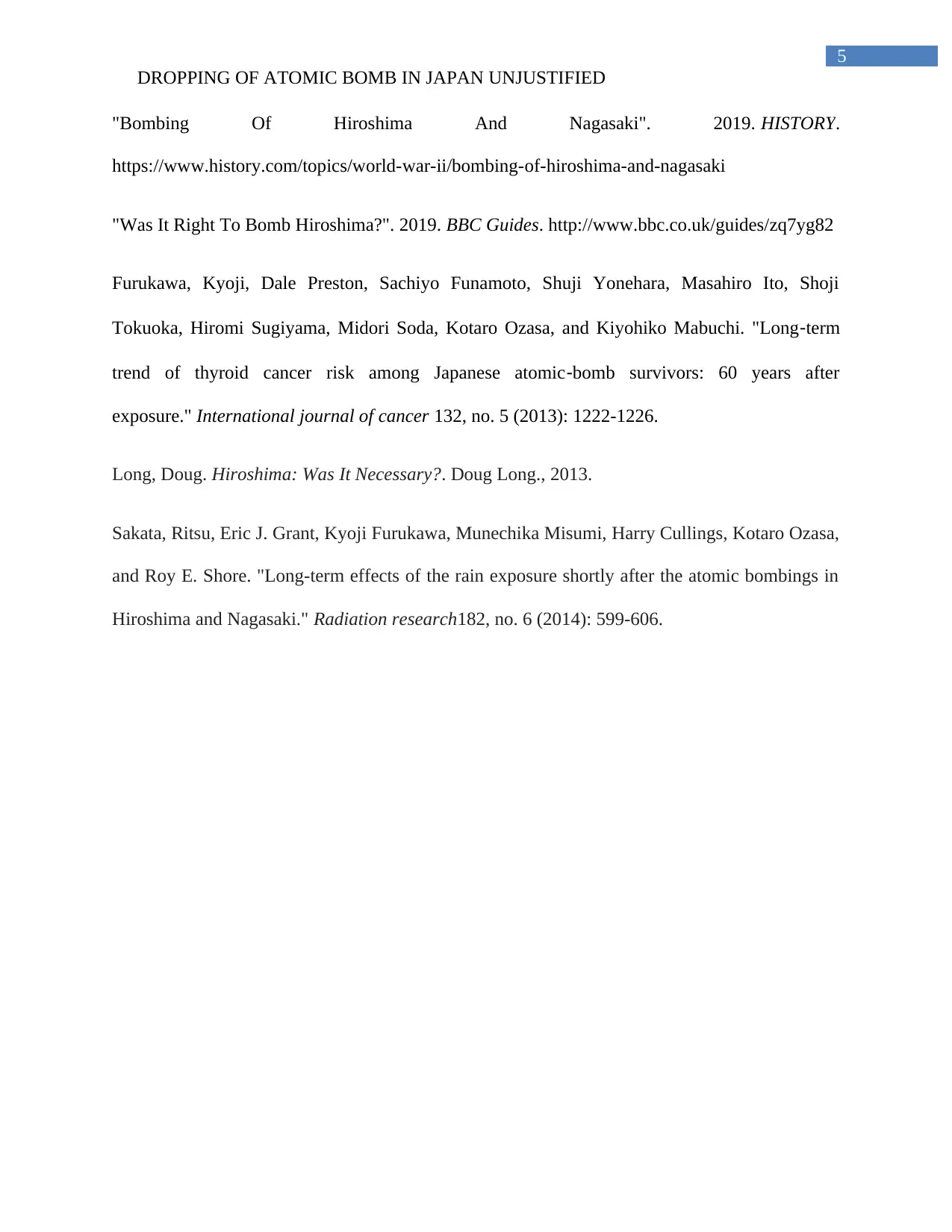
5
DROPPING OF ATOMIC BOMB IN JAPAN UNJUSTIFIED
"Bombing Of Hiroshima And Nagasaki". 2019. HISTORY.
https://www.history.com/topics/world-war-ii/bombing-of-hiroshima-and-nagasaki
"Was It Right To Bomb Hiroshima?". 2019. BBC Guides. http://www.bbc.co.uk/guides/zq7yg82
Furukawa, Kyoji, Dale Preston, Sachiyo Funamoto, Shuji Yonehara, Masahiro Ito, Shoji
Tokuoka, Hiromi Sugiyama, Midori Soda, Kotaro Ozasa, and Kiyohiko Mabuchi. "Long‐term
trend of thyroid cancer risk among Japanese atomic‐bomb survivors: 60 years after
exposure." International journal of cancer 132, no. 5 (2013): 1222-1226.
Long, Doug. Hiroshima: Was It Necessary?. Doug Long., 2013.
Sakata, Ritsu, Eric J. Grant, Kyoji Furukawa, Munechika Misumi, Harry Cullings, Kotaro Ozasa,
and Roy E. Shore. "Long-term effects of the rain exposure shortly after the atomic bombings in
Hiroshima and Nagasaki." Radiation research182, no. 6 (2014): 599-606.
DROPPING OF ATOMIC BOMB IN JAPAN UNJUSTIFIED
"Bombing Of Hiroshima And Nagasaki". 2019. HISTORY.
https://www.history.com/topics/world-war-ii/bombing-of-hiroshima-and-nagasaki
"Was It Right To Bomb Hiroshima?". 2019. BBC Guides. http://www.bbc.co.uk/guides/zq7yg82
Furukawa, Kyoji, Dale Preston, Sachiyo Funamoto, Shuji Yonehara, Masahiro Ito, Shoji
Tokuoka, Hiromi Sugiyama, Midori Soda, Kotaro Ozasa, and Kiyohiko Mabuchi. "Long‐term
trend of thyroid cancer risk among Japanese atomic‐bomb survivors: 60 years after
exposure." International journal of cancer 132, no. 5 (2013): 1222-1226.
Long, Doug. Hiroshima: Was It Necessary?. Doug Long., 2013.
Sakata, Ritsu, Eric J. Grant, Kyoji Furukawa, Munechika Misumi, Harry Cullings, Kotaro Ozasa,
and Roy E. Shore. "Long-term effects of the rain exposure shortly after the atomic bombings in
Hiroshima and Nagasaki." Radiation research182, no. 6 (2014): 599-606.
⊘ This is a preview!⊘
Do you want full access?
Subscribe today to unlock all pages.

Trusted by 1+ million students worldwide
1 out of 6
Related Documents
Your All-in-One AI-Powered Toolkit for Academic Success.
+13062052269
info@desklib.com
Available 24*7 on WhatsApp / Email
![[object Object]](/_next/static/media/star-bottom.7253800d.svg)
Unlock your academic potential
Copyright © 2020–2026 A2Z Services. All Rights Reserved. Developed and managed by ZUCOL.





